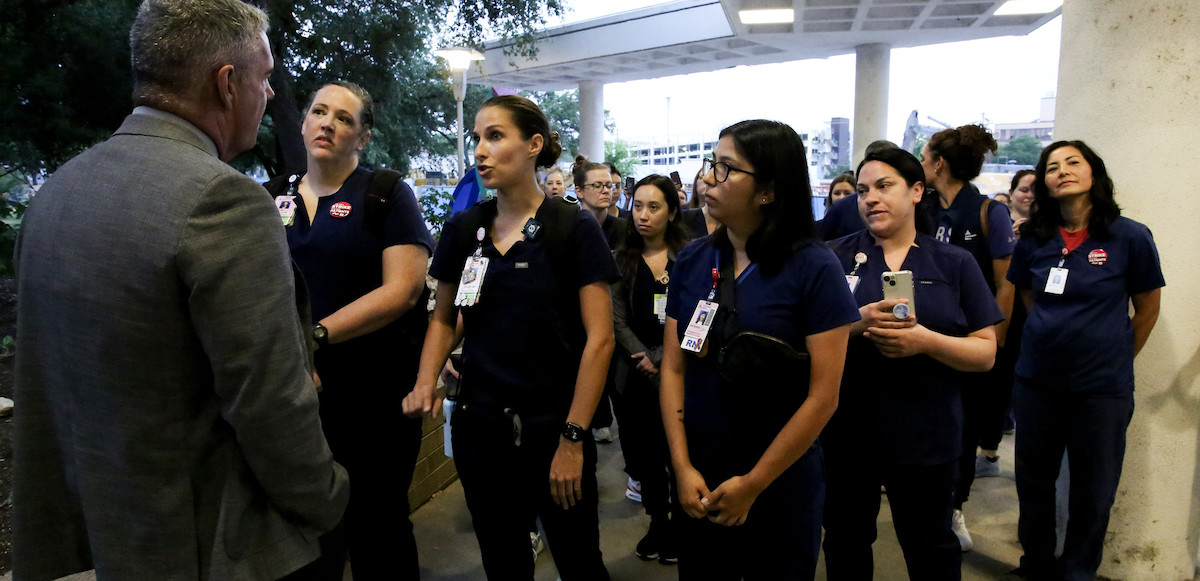Newly Organized Nurses in Texas and Kansas Strike for a First Contract

Locked-out Ascension Seton Medical Center nurses in Austin, Texas, confront a representative of the hospital’s administration on June 28. The company locked them out for three days after they struck, but the move backfired. Photo: National Nurses United.
Through wet weather in Wichita, Kansas, and scorching heat in Austin, Texas, hundreds of nurses walked picket lines June 27 in a one-day strike for safe staffing and patient safety. Nearly 2,000 nurses represented by National Nurses United (NNU) walked out.
They’re trying to get the company to bargain in good faith after winning union elections in the last year at the three struck locations: Ascension’s two campuses in Wichita and Austin’s huge Ascension Seton Medical Center, where 900 nurses work.
“Our patients are being shortchanged by management, because they are short staffing our units,” said Monica Gonzalez, a medical-surgical nurse and 19-year veteran of ASMC. “We know that Ascension has the money to invest in hospitals and patient care, and they are choosing not to do that.”
Ascension “runs a like a for-profit even though it’s a supposed to be a nonprofit,” said Marvin Ruckle, a nurse at Christi St. Joseph in Wichita who began working for Ascension in 1989.
According to NNU, the Catholic nonprofit holds “$19.5 billion in cash reserves, an investment arm that manages $41 billion, and a private equity operation worth $1 billion.”
UNSAFE HOSPITALS
Nurses in Austin and Wichita also reported workplace violence related to short staffing and management neglect.
“When our patients are being held in the ER for such a long amount of time,” said Shelly Rader, who’s worked as a nurse for 19 years at Wichita’s Christi St. Francis Hospital, “sometimes more than a day, waiting to be admitted… [patients’ and their visitors’] emotions start to get high.”
Rader said she’s seen nurses get physically hit and have their hair pulled. Having more staff “would help to move patients along quicker,” she said, and avoid situations that lead to threatening and violent behavior.
In Austin, an individual “threatened to come in with a weapon and hurt the staff,” Gonzalez said. “And we were not alerted by Ascension.” She found out from another nurse.
ASMC normally maintains just two private security guards during nights, but Gonzalez noted that Ascension “had no problem providing four or five times that many security guards last week during our picket.”
TRAVEL NURSES JOIN IN
The one-day strike was a morale-booster, though. “What I’ve been hearing from many of my co-workers is that this has been one of the most, if not the most, empowering moments” of their careers, said Matthew Clark, an intensive care nurse at ASMC. Rader agreed, reflecting on the experience at St. Francis.
Many of Ruckle’s co-workers at St. Joseph’s told him that they should have gone on strike “for more than 24 hours.”
At St. Joseph’s, travel nurses who were already working at the hospital refused to cross the picket line. Their contracts are separate and they risked termination for the act.
“I can only speak to what I’ve heard from a couple of them, but they were offered more money,” Ruckle said, which they refused.

SUPPORT LABOR NOTES
BECOME A MONTHLY DONOR
Give $10 a month or more and get our "Fight the Boss, Build the Union" T-shirt.
At ASMC, “overwhelmingly, I will say that even the travel staff at our facility are immensely supportive of what we’re doing with our union and what we’re fighting for,” Clark said.
Members of the housekeeping and ancillary staff at St. Joseph’s could also be seen wearing red in solidarity with NNU during the strike.
In Wichita, teachers, plumbers, and pipefitters walked NNU’s picket lines; so did Teamsters, Steelworkers, and a delegation of striking machinists from Spirit Aerosystems. Ascension nurses also sent solidarity delegations to the machinists’ lines.
In Austin, picket lines featured strong community support from Restaurant Workers United, Starbucks workers, union electricians and plumbers, and the Austin chapter of the Democratic Socialists of America.
LOCKOUT BACKFIRED
After the strike was announced, management scrambled, declaring a three-day lockout June 28-30.
But Gonzalez said that management’s retaliation backfired as the hospital ordered nurses not originally scheduled for shifts on June 27 to report to work to scab or else be regarded as strikers and subject to the lockout.
“There’ve been nurses, I’m sure, that may have been willing to cross the picket line and work, but because they had to come in on the day of the strike [or get locked out], they were not willing to do that.”
The lockout “really served to galvanize the staff,” said Clark. In Wichita, travel nurses who joined NNU picket lines also became subject to the lockout, increasing the hospital administration’s woes.
The strike and ongoing negotiations mark the culmination of three successful organizing drives. Last September, the 900 nurses at ASMC established what NNU says is “the largest private sector nurse union in Texas.”
Two months later, 650 nurses at St. Francis’ Hospital in Kansas organized; then in March, 300 nurses joined at St. Joseph’s.
Return-to-work marches to confront management at each campus were held July 1. The next round of contract negotiations in Kansas are set for July 14 and 28, with ASMC’s scheduled for the end of July.
Meanwhile, according to NNU, Ascension is now working with two union-busting firms. In Wichita it hired the notorious Littler Mendelson, used against organizing efforts at Starbucks, and in Austin it hired Hall Render.
Seth Uzman is a writer and activist based in Houston, focusing on Texas social movements and political economy with bylines in Jacobin, Truthout, and Esquerda Online.





